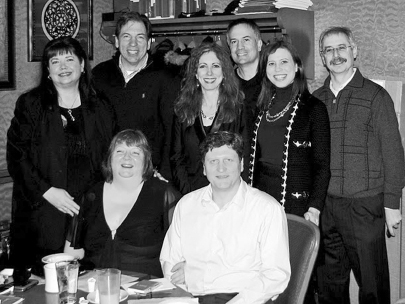ACKNOWLEDGMENTS
This book wouldn’t have happened if Joanne’s husband, Tom Distler, hadn’t insisted that she write an article about Mr. K’s remarkable memorial concert. For Joanne, the memorial was deeply personal. But Tom realized that Mr. K’s story deserved to be shared, first in the article and then in this book. Thank you, Tom.
The fact is, neither one of us set out to write a book. For years, Melanie found it too painful to even speak about her sister, Stephanie. But encouraged by her husband, Ed Harrison, she started writing privately about Stephanie in 2009 while on a sabbatical to spend time with her father. After his death, in 2011, Melanie got a call from the Greece, New York, police, with the news that Stephanie’s murderer had confessed. He was, as the police suspected, the handyman at her apartment building, who was now in prison serving two life sentences for other crimes. His murder trial is set for 2013. For Melanie, that phone call and the resolution of the case after so many years seemed like a sign that Stephanie was ready for her story to be told as well.
So many people helped make this book possible. On one of Mr. K’s last visits to Miriam Cotter’s home, he hugged her and whispered in her ear, “You are my third daughter.” Without Miriam holding her hand through the most difficult moments, Melanie might never have found the courage to go on. To list all of Miriam’s contributions would require a volume of its own. Suffice to say that even though Stephanie is gone, Melanie still has a “sister” in the truest sense of the word. Thanks also to Miriam’s husband, Hilary, her parents, Charlotte and Albert Simon, and the entire Simon and Cotter families.
Nor could we have written this book without Joanne’s sisters, Michele Fusillo and Rhonda Slaff, who in the writing process—as in life—have been invaluable guides. Joanne’s mom, Diane Lipman, was a font of memories, of inspiration—and of photos taken by Joanne’s late father, Burton Lipman, whose spirit of adventure lives on in this book. We are grateful to them all.
Dr. Sandra Dackow provided insights, anecdotes, and decades-old recordings. Darlene Morrow Brandt offered up a trove of “Mr. K stories,” and kept us laughing throughout. We are grateful as well to Joan Kupchynsky, who helped reconstruct Mr. K’s story and who cared for him so lovingly when he was ill.
Thanks, too, to Mr. K’s other former students and colleagues, including: Anna Braun, Peggy Brighton, Paul Fried, Jonathan Friedes, John Gnassi, Michael Grossman, Diane Kerslake, Ted Kesler, Ken Langley, Donald W. Meyers, Kelly Reid McLaughlin, John Stine, LouAnn Stine, Marge Stine, Gordon Tedeschi, Miriam Kling Perkoff, and Andrew Woodruff. Thanks also to Walter Drone and Kappy Scates, who brought to life Mr. K’s experiences in Shawneetown.
Charlie Lyons was irresistibly persuasive in urging us to tell this story publicly. Jeffrey Zaslow gave us the final push we needed to embark on the book. We are so grateful to them both. Tragically, Jeff passed away before the manuscript was completed.
The mystery of Mr. K’s childhood history required tracking down numerous Ukrainian and German documents. Thanks to United States Holocaust Memorial Museum Chairman Tom Bernstein as well as to Sara J. Bloomfield and Neal Guthrie. Our appreciation also to Timothy Snyder, Katia Davydenko, Olha Aleksic, Ksenya Kiebuzinski, Phillip Neumann, Kathrin Flor, Nick Kupensky, and Anika Ohm.
We are humbled by, and in awe of, refugee camp survivors Ihor Hayda, Olga Sawchuk, and Helena Melnitchenko. A special thanks to Taras Hunczak, Rutgers University history professor emeritus, who shared his knowledge plus checked the accuracy of our historical descriptions and Ukrainian spellings.
Joe Dizney, Edward Felsenthal, and Amy Stevens were early readers whose suggestions improved this book immeasurably. For their insights and encouragement, thank you as well to: Katie Couric, Kevin Goldman, Jeff Greenfield, Andrew Heyward, Karen Lyons, Inge Reichenbach, Bruce Rockwell, Tony Schwartz, Bob Scully, Ivan Selin, David Shipley, Phyllis Strong, and Barbara Walters. Thanks also to Maestro Riccardo Muti, Deborah Rutter, Vanessa Moss, Martha Gilmer, Rachelle Roe, John Deverman, Anne MacQuarrie, Frank Villella, Ann Smelser, Benjamin Zander, and the Ladies of the CSO Locker Room, especially Catherine Brubaker, Rachel Goldstein, Florence Schwartz, and Susan Synnestvedt.
Books take a village, and we are lucky to live in ours. Kerri Kolen and Elisabeth Dyssegaard are brilliantly talented editors who helped shape this book in ways both big and small—and made every step a pleasure. The Black Russians are on us! We are enormously grateful to Ellen Archer for her passion, support, and vision, and to her Hyperion colleagues, including Diane Aronson, Shubhani Sarkar, Laura Klynstra, Maha Khalil, Kristin Kiser, Nancy Tan, Theresa Karle, Christine Ragasa, Bryan Christian, Elizabeth Hulsebosch, and Jonathan Bernstein. Special thanks to Allyson Rudolph and Sam O’Brien for their assistance and attention to detail.
The incomparable Suzanne Gluck has been our partner throughout this process. She saw the potential of this book right at its inception, and she has been a tireless advocate and critical reader all along the way. She is simply the best, and so are her colleagues at William Morris Endeavor: Cathryn Summerhayes, Tracy Fisher, Claudia Ballard, Anna DeRoy, and Eve Attermann.
Most of all, we are grateful to our husbands for their sound advice, encouragement, sympathetic ears, and willingness to pick up the slack at home. And to our children, who are an endless source of inspiration and love.

The reunion brunch before Mr. K’s memorial concert. Standing, left to right: Miriam Simon Cotter, John Stine, Miriam Perkoff, Michael Grossman, Joanne Lipman, Jonathan Friedes. Seated: Melanie Kupchynsky and Edward Harrison.